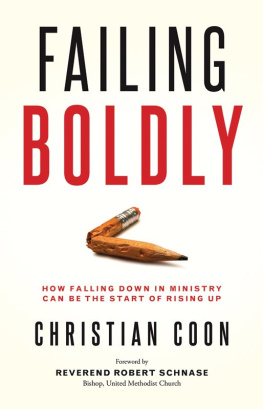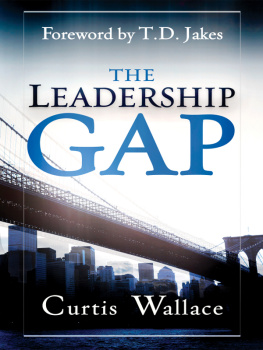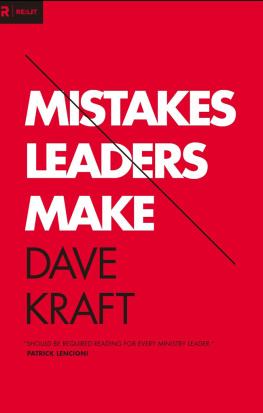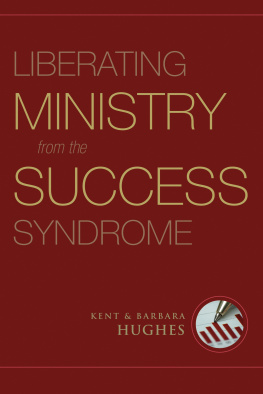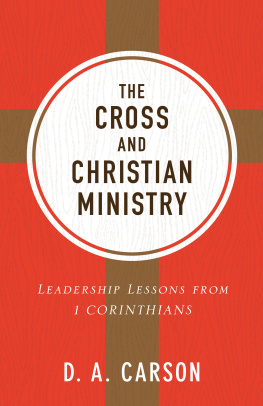W hen you fold an 8 x 11 piece of paper in half and set it on a table, it makes a nice little pup tent. The sides are nice and straight. The crease at the top is clean and crisp. You can put words on both sides for all the world to see.
One summer evening in 2009, my friend Trey Hall and I created one of those paper tents. On one side, it said, New Church for Chicago! and we placed it proudly on a table inside a little Starbucks caf, which was inside a large Barnes & Noble bookstore. Trey and I were a couple weeks into a rather daunting venture. We were full enough of ourselves (and hoping that we were also full enough of the Holy Spirit) to think we could start a new church in this great city that would, as we often said, do church differently. It was a pretty audacious sentiment.
Church has been done for centuries so our attempt wasnt really all that different, but when attacking great ventures, deluding yourself into thinking that youre blazing new trails helps. If I waited to do something that was absolutely original and had never been attempted before, I would never have started anything. I did realize that we were starting something new in this particular place and at this particular time.
We put a notice on Meetup.com about an informal gathering of this new church at this Barnes & Noble on the corner of State & Jackson and thought, surely, we would overwhelm this store with hordes of people who had been hungering for just what we were offering. A few minutes passed and no one showed up. People are just getting off work, we told ourselves, and then more than a few minutes went by. No responses. One man did show up, and we had a nice conversation, but I also was looking out of the corner of my eye to see if others would stop by. They didnt. The staff at the Starbucks could rest easy that there would be no danger of exceeding their seating capacity. As the evening went along, our little paper tent, as all paper tents do, started to sag, and as we got up to leave, it was nearly flat, as were my hopes for a grand kick-off to this new venture.
Thankfully, things have gone better since then. A few people heard about us and word got out and we cobbled together enough interested people to launch worship for this new thing that we called Urban Village Church the following March. Since then, weve started three additional worshiping locations, and we seemed to have found a niche in the city with this way of doing church and sharing the love of God and neighbor.
But I am not writing this book to tell you how great things are. I have many church-growth books on my bookshelf and numerous three-ring binders in my closet from conferences that share secrets to church success. I have gone to seminars where a polished speaker has the great ProPresenter presentation and spells out steps that one can follow so that you, too, can EXPERIENCE AMAZING GROWTH IN YOUR CHURCH!
While occasionally helpful, I have grown a little weary of those books, conferences, and seminars. I often walk away from them feeling depressed and discouraged. What Id love to know, Polished Church-Growth Speaker, is what happens when you dont succeed? Talk about your screw-ups and your missteps. Tell me how you failed because then I find you eminently more relatable. Its difficult for me to hear (and follow) your steps to success if you dont share a bit of your humanity with me. (Which may be a key reason why so many have been drawn to ChristianityGod sharing Gods humanity with us!)
As I thought about this book and discerned different ways of writing it, that theme of failure kept coming to mind. Ive been a pastor since 1997, and one thing that has always been true is whenever I preach about my foibles and ways in which I fall short, people respond positively. Folks want to know that theyre not the only ones who have doubts and travel down wayward paths. They want to know that they are not the only ones who fail. I hate to trot out the Misery loves company aphorism, but knowing that youre not the only one who has fallen flat on your face is strangely encouraging.
So this book is not really about success. I will not give you Five Reasons Why You Must Start a Multi-Site Church or Ten Steps to Reach Millennials. This book is about failure. Or, rather, this book highlights ways that churches (including ours) have failed. It also takes a look at how failure is a part of our faith; how there are numerous examples of biblical characters who are now forever memorialized in stained glass but didnt get things right at first. Later in their lives, however, they realized that God was able to further Gods movement of grace and love through their failures.
But before you think, Why would I read something that may be full of discouragement and despair? I want to assure you I offer hope and encouragement, too. Ill talk about failure, yes, but also how failure is a springboard to new experiences and, hopefully, a deeper connection to God and what it means to be a leader in the church. I do not want you, church leader, to read this book and try to be Urban Village Church or Christian Coon. I do hope that reading it gives you the courage to fail. By that I mean, I hope that if fear of failure is one of the reasons youre not attempting something different in your context (regardless of whether its cutting edge or not), maybe reading how others have failed and survived gives you the nudge to experiment and, if youre lucky, fall flat on your face.
Why would failing make you lucky? Thats what well explore. In the first chapter, I start by defining failure and giving an overview of how we understand success and failure in the church. Sadly, there are so many reports about the failures and decline of the mainline church, leaders have either shrugged their shoulders and not done anything to respond, or they so fear failure that they frantically and frenetically grab at the next big cure-all that will bring success. I wont get into why things have failed (there are plenty of other books about that), but I want to explore why failure has defined and paralyzed the church and stopped it from taking risks.
What helps us respond to failure is being reminded of one of the core foundations of our faith: Gods love for us, which I write about in the second chapter. This never, ever changes, and I think sometimes leaders dont let this become fully integrated into their lives. United Methodists, when reading about John Wesleys Aldersgate experience, focus on the heart strangely warmd phrase, but another part of that confession also inspires me. A few words later Wesley wrote: An assurance was given me that (Jesus) had taken away my sins, even mine . Its that even mine phrase that I love. We hear phrases like Christ takes away my sins or God loves me, but its that moment when we let that sink in (even mine! even me!) that is life changing. Too often, Christians get their sense of meaning from external sources rather than believing that Gods grace and love are sufficient. We cannot fail/risk until we fully let that grace and love become part of who we are.
Lots of books highlight successful biblical characters (Im looking at you, Jabez), but its important to consider how the Bible not only includes but highlights failure. Thats the third chapter. Exploring sacred stories (like the parable of the sower, Zechariahs response to an angel, and, of course, numerous hiccups from the disciples) help us realize that even holy people took some wrong turns and experienced frustration.
After weve established that failure is OK (even encouraged), its important to share some how-to steps. Chapter 4 is Failure 101. Heres where we discuss steps you might take to integrate risk, innovation, and failure into church life and share some examples of how Urban Village and other churches are living this out.
We must recognize, though, that failure can be crippling (I speak from first-hand experience), which we explore in Chapter 5. Its one thing to know how to integrate failure into church life, but we must also know how to respond in those moments when opening up a food truck seems like a great career option because anything would be better than the mess at your church. Ive had plenty of moments where I lament in my journal that nothing Im doing is right and why on earth would God want me to do what Im doing and maybe I should have stayed in that summer job where I sold childrens shoes after all. In grace-filled moments, though, God speaks and reminds me that failure isnt final. And that I dont have the patience to horn kids feet into shoes.
Next page
